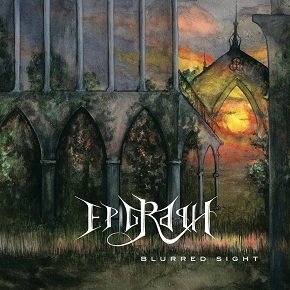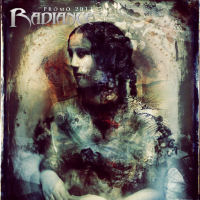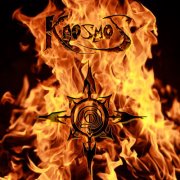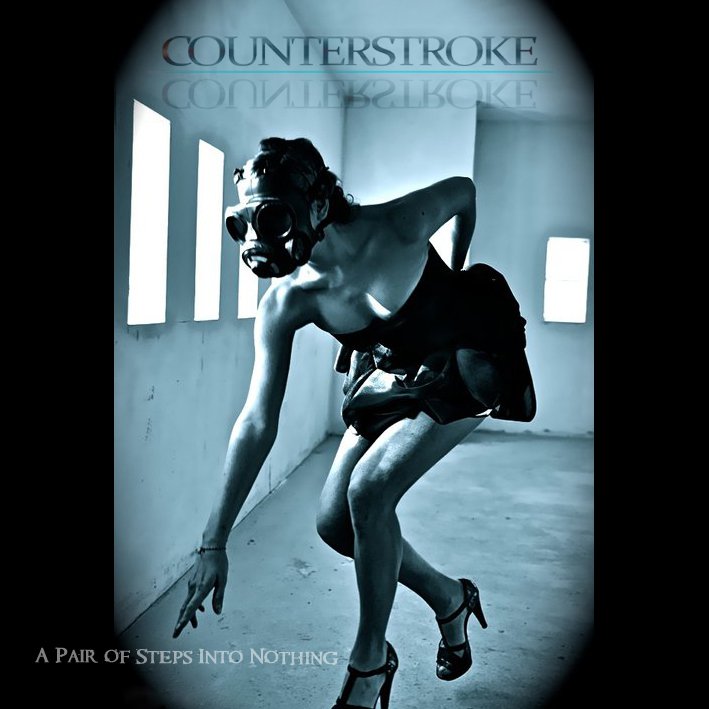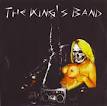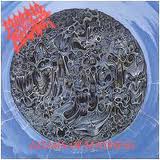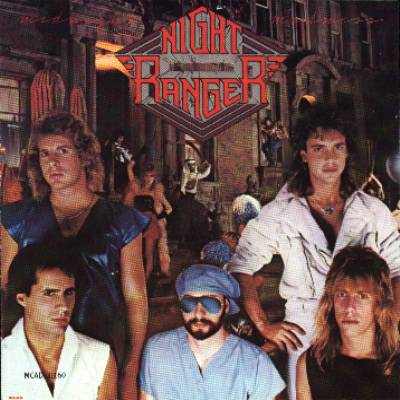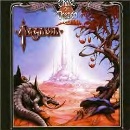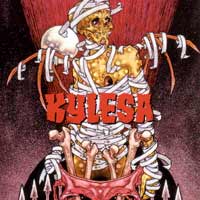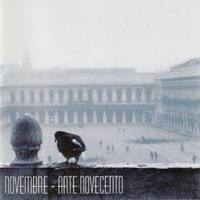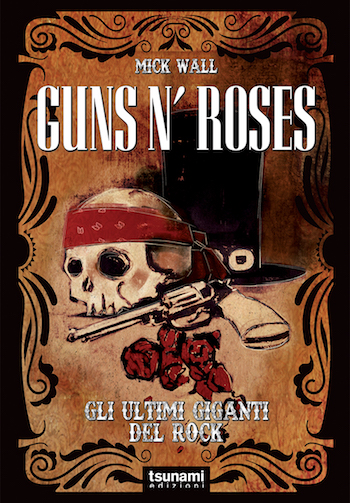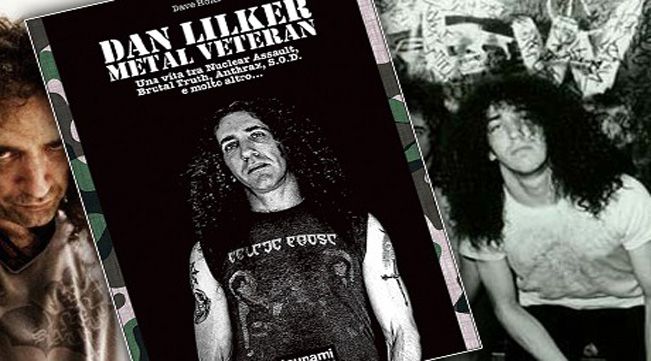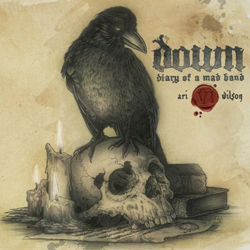Myrkur
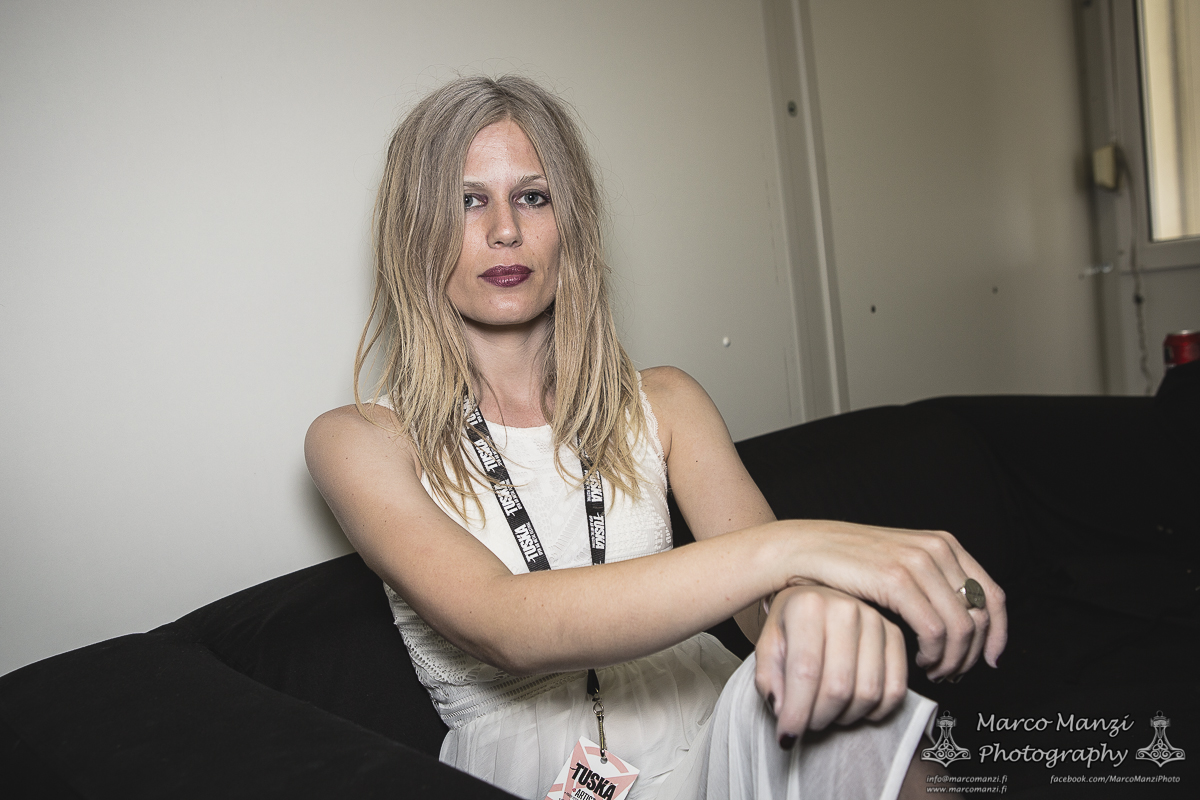
Line up:
Live 2016:
Teloch -Guitars
Sir - bass
Rasmus Schmidt - Drums
MM: First of all, thank you for this interview and congratulation for the show! It was really good. I think Myrkur has been a band that since the beginning has had a lot of controversial answers from the audience, a lot of people love your work, love what you do, embrace your music as something original and more fresh… other people instead have directed a lot of negativity towards your music. So I wanted to know how do you feel about this, and if you did expect this kind of reaction?
M: No. I don’t think that anyone could ever expect that kind of reaction towards themselves. But I feel in a way that the fact I did get that type of reaction, both the strong positive and the strong negative, makes me feel like what I do is right, and that I should be doing it. So, not that I would change my mind, I would still do it. But you know, I feel pretty good about it actually!
MM: After all, it’s the way in which you express yourself, through your music. So I don’t see why you shouldn’t be ok with that, and with the criticism that comes with it.
M: Yeah, exactly. But it’s always… it’s weird as a human being to get this kind of reaction, because I always try to think that I am no more important than you, or her, or a tree, or a dog. So I don’t understand why all this “fuss” about me. It’s weird.
MM: Do you think that maybe it could be related also to the fact that we are talking about a very closed scene, in black metal music, and people see something perhaps “different” coming, like you… You have your own character, you do your own thing, what you want to do… and what you do is different from everything else. So do you think it’s maybe due to that, or maybe also the fact that there are not so many women that actually do this kind of stuff?
M: Maybe… I think that there are a lot of reasons why I got a great responses and a lot of bad responses. I don’t know if you can pinpoint it to one single thing. I feel like a lot of people want to do that, and they say maybe “oh, she is a woman” or “it’s bad for that type of music” or this and that… “it’s how she looks”, “it’s how she sounds”.
I just think it’s a lot of different things, and I am fortunately sort of free from all of the traditional ideology of black metal, cause I am outside of any scene or genre. I don’t care. The people that I work with are, I guess, categorised into black metal, and some of them have sort of made the genre what it is today, and even they don’t believe in that ideology anymore. For a lot of them, what they did, they did when they were 17, and if someone would ask me: “would you like to do now what you did when you were 17?”, I’d say “no!”. So that’s how we feel. So it’s all… it’s wrong. There is a big gap between the bands who made the genre, and this scene, and the fans.
MM: It’s this contrast that actually makes it so interesting, that it is really divided in a way.
M: Yeah.
MM: But how would you actually define your music then?
M: Uhm… this isn’t just because it’s me, but I really don’t give a fuck about genre. Everything I have ever done - or I will ever do - has had different styles. You know, genre labels are fine, they can be helpful… my record label likes to put a genre on me so that it’s easier to say “oh here, it’s this what you should listen to if you like this particular band”. But it doesn’t matter to me. I mean, what genre label would you put on Tchaikovsky, or… I don’t know… It doesn’t really matter, it is simply great music!
MM: Yeah. I mean, what is important is the fact that you are able to express your music and it doesn’t mean there has to be a specific label onto it.
M: Exactly! Or it has to be, but for me personally, I don’t have to do that. I don’t have to call it black metal, and I don’t have to call it “Not Black Metal”. I just don’t care.
MM: Absolutely.
Now after hearing your thoughts on this I would like to go a little bit back to your childhood, and ask you first of all which bands you have been first influenced from in your music, in your creative work, and what brought you to what you are now.
M: I would say that I don’t think as a human being - or as a musician - you really think about who has influenced you. But what I have liked in my life is for example folk music, a lot of Scandinavian, traditional folk. Even the Christian choir. We have some great songwriters and composers from hundreds of years ago… and I love choir music. I love the Nationalistic “golden age” of Romantic Scandinavian - particularly Danish and Swedish - songs. I like the Norwegian composer Grieg, or the Swedish Stenhammar. And I must confess I love Sibelius, as I love Finnish composers too. I think they are amazing actually… very underrated scene here! We always talk about the other ones from the North, but there is some incredible music here.
MM: True, I actually didn’t know much about Sibelius before I moved to Finland, and then found out a lot from the Finnish culture, and discovered so much from his compositions.
M: And Finland has a very interesting story too. There is a lot of power, and aggression, you know… freeing itself from the Russians… it’s very interesting to me.
Then, aside from that, I always liked King Diamond as a kid. I like it, and I have maybe taken that into my own music cause in a way… he sings with two voices, he is kind of a divided person, and he talks to himself on stage, he tells stories. He tells his own sort of little “horror movies”, and I have always liked it even as a little child. He seems also very fascinated by childhood - the same way as I am - and by “being scared”.
Maybe it’s for people who were really scared as children, you know, who have had very dark experiences. We constantly try to therapeutically get through it by listening to that kind of scary stories, that can distract us. I don’t know. But that’s another thing I’ve taken with me. I have had experiences I wish I could live without, but it’s something you know. That you can have some feelings that are dark, and that you don’t know what else to do with. I can express them on stage, I can express them in music, or even when I listen to certain music… the kind of “I can reconnect with myself”-type of thing.
MM: I was wondering exactly about this now, because I see that in your music there is this really sharp contrast between when you are singing with clean vocals - let’s say - those more “ethereal” sort of vocals, and then this… anger, that is coming out all of a sudden.
M: Yeah, and sorrow, and darkness…
MM: You can feel it really from your music.
M: I am glad that you think that. Yeah, it’s like a safe place where to access the feelings that can be difficult to access otherwise.
MM: I also do something similar when for instance I listen to certain types of music, according to the mood I am in, and how I feel at that moment.
M: That’s what a lot of metal music can do! It tends to have a fanbase that is very dedicated, because it just makes you feel things that not a lot of other genres do, to be honest. Metal as a whole. Even the “bad” metal! Even the shitty, cheesy music, still makes you feel something.
MM: Yeah, and as it’s in a way a small community, people often are much closer than in other types of music.
M: It’s actually a huge community when you think about it!
NH: It’s massive!
M: I just saw that, I talk of this as an example, the most streamed genre on Spotify is metal. And the fucking festivals? I mean, we just played Hellfest! It has a hundred-twenty-thousand people! This is not a sub-genre. But it’s just… because it’s out of the commercial, and Top 40 reach, it doesn’t care about it, and the people don’t care about it either. It’s like two things that stay apart, but it’s beautiful to the bands that just get to thrive from this fanbase. But yeah, there is a closeness, an intimacy, which is why I think you said it’s a small community.
MM: Yeah.
M: There is like a “realness” there, that lacks in other places.
MM: I think so too.
But let’s speak now instead about your record: with your debut album you have had a lot of contributions from what are considered “big names” in the scene. And Garm has been doing the production of the album. So how did you get to meet with these guys and to get them involved in your work?
M: Well, I have always been a big Ulver fan, and I wasn’t really quiet about that either. I’ve always listed them as an inspiration, and he heard about me of course because there were so many people writing about me, and I met him in the same way: I got a chance to talk to him over email, and I didn’t even expect him to want to write me back. Let alone produce the record! So that’s where it started.
Then he said, because Oslo at the end of the day is still a great place for black metal, you know, it’s really still were you should go, maybe. There is a community. So he is within reach of incredible talent, and they all wanted to be involved in the record, while I was just happy he just started to write, and he said “I think we should work with this, this, and that”, and I said “Ok, that’s amazing!”.
So it was smooth, I mean, I didn’t have to do anything really. They heard all the demos, I had tons of demos. We picked out what was best, and it was all so collaborative, the whole thing. Even though it was clearly my vision and my demos that we went for. But he is good, Kris. With that. To work with in that way.
MM: While as far as your composition goes, you mentioned before that you have been taking a lot of inspiration from the folk music and Scandinavian folklore… and also from nature I think. It’s a very common theme in Scandinavia, that people have this really strong connection with nature, and they have all these tales… it’s a very different culture than the rest of Europe, I would say. It’s a unique thing. How much of that is something that you consider as part of your music?
M: It’s a big part of it, I would say! Because really what I do most of the time is being out in the nature. I mean when I’m home and I am not doing anything else this is what I do. We sleep a lot outside when we don’t have shitty weather… even it it’s like going just nearby… there is a forest next to us.
Even if it’s just going there to sleep, or just to cook. And we can even just go back home and say “fine, this was not a good idea”, but it’s a good excuse to be outside all the time, and I find that it’s honestly - I hate the word “therapy”, but - it really is the best thing for me. Because nothing else is worth it! (laughs)
MM: I absolutely agree!
M: Yeah! and I can’t even… you know, I don’t wanna drink and do drugs and so on… I just wanna do that, and it works for me. That and the music. So I just stay within that!
MM: Oh yeah I know what you mean as I tend to get very stressed if I don’t get to spend enough time in the woods.
M: It’s horrible! I have lived in cities, and it’s rough. Especially if you grew up in… where are you from?
MM: I am from the Alps actually, on the Italian side.
M: Oh, so you are Italian? And you moved to Finland?
MM: I moved here, yes. Mostly actually also because of the nature here.
M: You know what? I had never been to Finland before! And I really wanted to stay here longer, but we have to leave tomorrow morning. What I really want to see is the nature they have here. As they call it the land of a thousand lakes, you know. I think there is really something kind of “mystical” about it, about this nature.
NH: I found that the musical difference across Scandinavian countries is related sort of directly to the layout of their land. How do you think about the difference between them - since you did do that work in Norway - do you think that it impacted more the Norwegian landscape, or do you think that’s still very much the Danish sort of flatland?
M: The truth is that I, my music… when I brought it to Norway even the Norwegians were like “ok, tone it down with that Norwegian thing you have”. Cause I was obsessed with it, and I just am. So, I think somebody was like “You are more Norwegian then Krieg’s ghost”-or something! Which I am not, but still… but then I also was happy that we were recording in Oslo, even though it was on a sort of a hill, mountain-type of place. It was there where the “Scream” was painted, it was literally there, it’s called Valhallveien.
But Oslo itself is quite bleak and depressing. I didn’t want something like a fairytale, you know. I wanted also the depressing part. Because I think that’s part of why black metal is so big in Scandinavia. It’s also very depressing. Finland is the number one country in the world for suicides, you know. Denmark is pretty much up there too, and so I wanted that aspect as well. It wasn’t just about the beautiful nature.
NH: So you’ve got sort of that child perspective, you got the nature perspective… there is a lot in your music here which is actually very much in touch with the feminine side then. Because when you are bringing back things about children and about nature, the whole - sort of - feminine side, comes in. How much do you think you are actually putting in of that directly into your music, so that it’s actually reflective of yourself, that would not happen if you weren’t a metal musician?
M: Ah, yeah… that of course is an impossible question to answer. Because I am just me. But I don’t think that it has to be an exclusive female thing there. I think that if even men would watch it (the nature, the atmosphere), then it would speak to them directly too. Because at the end of the day a woman has that archetypal goddess, mother nature figure… all these things… and there is no filter, so when you communicate this it goes straight to man AND woman. So it’s not a female thing.
Probably I am - very much - I guess that I am surrounded by a lot of women, and I have a close relationship to my mother and grandmother. So I am fortunate to have been a lot in touch with it, and at the same time was allowed to do, you know, “boy things”.
NH: I asked that because our magazine (HelRocks) is actually started by two women, myself and a friend of mine, and we have an equal split of the staff. And we always found that, you know, what’s your gender, that’s not important to us. But what I have found is that the way that I photograph something, and the way that Marco photographs something… we look for very different angles, although we are facing the same subject.
M: Yeah, of course! Yeah!
NH: And we found sort of that the longer you spend with that, the more you realise that sort of the impact of the feminine on this actually allows some guys to express some things.
M: Yeah!
NH: Cause then I go… you know, when you are on stage… you’ve got sort of that “beautiful goddess” side on stage, then you’ve got the “violent witch” on the other side, just letting it go… And do you think it’s because of that actual “shock” that contrast the female archetypes, the reason of why you have actually had some violent reactions - from those horrible messages you have been sent - you think that’s actually because you are challenging that directly?
M: yeah… I think that, and I think just in general in metal, men… they’d rather allow women to be there if they are more submissive, if they are more like “tits and ass”-metal. Not that there is anything wrong with that either. I don’t mind it. But I am feminine. And I don’t really need to be… I don’t wanna dress like a man. But I used to as a child, you know. I would only wear my dad’s clothes. I just don’t really care, and I think that’s also why some men - not all - but some, got angry. Because I am not going to find an excuse for being myself. I am not apologising for being there. Or trying to please the stereotype of the woman you think that I should be - the type of look and behaviour, or sound, or anything. So I think that, and also the other thing that you said maybe.
NH: Cause you have got from… since you have gone from that nature-inspired and the childhood-inspired, is there a strong female archetype in that? Why so? cause there are a lot of female artists in black metal. There are lots of excellent female artists in black metal, including yourself, who have worked with it… and I do find that a kickback from that, does seem to be…
M: It’s interesting!
NH: All this ”she’s not submissive!”, “she’s not here to look pretty!”, “she’s yelling in my face!”… and that “she’s not just angry for being female”.
M: No! No! And I am not trying to be a man. I don’t think that women have to try to be a man to be in metal. I don’t see why I would have to do that, you know. But I think that people would find it easier to digest if I was like “I wanna be one of the guys!”. But I don’t, you know.
NH: You don’t wanna be easy to digest, you just wanna be…
M: No, I just don’t wanna be a guy! (laughs)
MM: Be yourself!
M: Exactly! I wanna be a dog. Or a wolf!
MM: Alright, unfortunately we are out of time already, but thank you again for this interesting chat!
M: Thank you!
Archivio Foto
Recensioni demo
Siamo alla ricerca di un nuovo addetto per la sezione DEMO, gli interessati possono contattare lo staff di Holy Metal, nel frattempo la sezione demo rimane temporaneamente chiusa.



